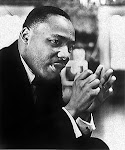Can you believe it? In the middle of a restaurant parking lot, some bozo calls me over after my boy has driven up into the van and ends up spouting the sentence in the title of this post. Followed, of course, with a "God bless you." (and I didn't even sneeze!)
As Paul Harvey would say, here's the rest of the story...
The family and I had just finished a very good lunch on a beautiful day and were just generally having a great time. Everyone loads into the minivan (my boy does so, of course, by driving up the ramp that has been deployed from the side of the van). I go into the van to transfer him from his powerchair to his car seat, then attach the tie-downs to the Koala and close the side door/ramp. As I walk around to the driver's side, I notice someone in a white pickup truck motioning in a way that a police report would decribe as "furtively." I thought it was probably some tourist who needed directions. So, I walk over and here is the conversation with the driver, whose 12-or-so-year-old son was sitting next to him silently. My inner, unspoken thoughts are in [brackets]:
Driver: "I don't mean to get real personal, but [oh boy, here it goes, what now?] what's wrong with your son?"
Me: "Nothing [and **** you, you ****]"
Driver: "Can he walk? [really, you just saw him drive a powerchair out of a restaurant and you're asking this stupid question, d-***?]"
Me: "No, but that doesn't mean there's anything wrong with him, there's not..."
Driver (interrupting): "Oh, I wasn't saying that. [yes you were, you creep, and why the hell did I come over here in the first place?]."
Me: "He's a perfectly happy, smart, mischevious, wonderful kid who happens to use a wheelchair to get around, there's nothing 'wrong.'"
Driver: "Yeah, he does really look happy. [unlike your sullen kid sitting next to you thinking "please shut up, Dad"]. I just want to say thank you for taking care of him. [and **** you for being such an ignorant bigot]"
Me: (rather flabergasted as this is a comment I've not heard before): "What? What do you mean? What in the world else would I do? [you sack of ****]. My son, my family live a full, happy, wonderful life..."
Driver (interrupting again): "No, it's just, you know, I just went for a mountain bike ride with my son, and...God bless you."
Me: [And, so what? I've been biking, sailing, running, swimming, horseback riding, etc., etc. with my son, and he's done more cool stuff at his age than I did before I was a teenager. I'll bet he's done a lot more cool stuff than your kid, and he certainly has a better role model for a father...and I don't want or need blessings from someone as close-minded as you].
I said nothing else, I just turned and walked away, not even acknowledging his last sentence.
Two things: First, I know he wasn't trying to be a close-minded, offensive bigot. But that doesn't change the fact that he is. Second, I wish I had not been so gob-smacked, so shocked, so nearly speechless. If I face this sort of situation again, I won't say the bracketed obscenities, but I hope it will go more like this:
Driver: "I don't mean to get real personal, but what's wrong with your son?"
Me: "There's nothing at all wrong with him. He's perfect, but I can't say the same for some people's attitudes and discomfort with disability."
Driver: "Can he walk?"
Me: "If he could walk, don't you think he'd be walking? He does use a wheelchair to get around, but that doesn't mean there's anything wrong with him, and frankly it's offensive to assume that a mobility challenge means there is something 'wrong.'"
Driver (interrupting): "Oh, I wasn't saying that."
Me: "Actually, you were. I think you probably did not mean to cause offense, but it is deeply offensive to assume that people living with disabilities are somehow 'broken' or 'imperfect' or less happy or well-adjusted than anyone else. I don't define my son by his abilities or disabilities, my son doesn't define himself in that way, and you shouldn't either. We all have different challenges, abilities, and disabilities. His happens to be physical and pretty obvious. But that doesn't mean he doesn't live a full, happy, magical life. He does -- he's actually pretty darn lucky compared to most people on the planet."
Driver: "Yeah, he does really look happy. I just want to say thank you for taking care of him."
Me: "Okay, now I think you probably again didn't mean any disrespect, but that comment is so deeply offensive on so many levels. First, he's my son and what would you expect any parent to do? Second, it's not your place to thank me for anything. You don't know my son, you don't know me, you don't know his needs, you don't know everything he adds to my life, you honestly don't know anything at all about this situation, except that you saw a four-year-old leave a restaurant on wheels. What gives you the right to call me over and make a comment like that? Third, that comment assumes that I am somehow burdened rather than blessed by my son. And, not only is that ignorant and wrong, but how dare you make that assumption? Thank you for not abandoning your son by the side of the road the first time he threw a tantrum at 2, or the time he broke one of your favorite things, or whenever something happened that required some parenting."
Driver (interrupting again): "No, it's just, you know, I just went for a mountain bike ride with my son, and...God bless you."
Me: "And, so what? I've been biking, sailing, running, swimming, horseback riding, etc., etc. with my son, and he's done more cool stuff at his age than I did before I was a teenager. I'll bet he's done a lot more cool stuff than your son sitting here. He is not so limited by his disability -- the real limitations come from an attitude by others that he is somehow less-than, or broken, or unhappy, or unlucky, or what have you. I ask you to please consider your attitude and why it has so offended me. And, it's not your place to 'bless' me. You don't know me, and, frankly, I don't want or need your blessings. I have plenty already. Three of them -- my two kids and my wife -- are sitting right there in that van and I'd rather be with them than talking to you in this parking lot, so I'll say goodbye and ask you to please just google disability blogs and read a few thoughts from the perspective of adults and teens living with disabilities. I really think you might find it eye-opening."
Okay, I know that's a fantasy conversation, but it's my fantasy so I'm sticking with it. I do think, though, that since anything that doesn't kill you helps you, I can use this pretty disquieting experience to improve my discussion of disability with ignorant and prejudiced strangers who regularly feel entitled to comment on my boy.









